#and i think it's a conclusive ending to his character arc
Explore tagged Tumblr posts
Text
i saw someone on ig say that katsuki was never chasing number one and it was always izuku and while i can see some potential truth in that i absolutely hate when katsuki's character gets dumbed down to just being all about him (and vice versa as well !)
ofc both of their arcs and story have a lot do w each other, you cant have katsu w/o izu n you cant have izu w/o katsu :3 and i do know that katsuki projected a lot of his insecurities and shortcomings on izuku and did want to sort of catch up to him but also bothem did want to be number one not for the sole reason of reaching or surpassing each other but bc at the end of the day theyre both loser hero fanboys lol and i love that about them.
maybe im just not as normal about katsuki as the next person but his line about absolute victory being what makes a hero not only cus you beat the bad guy but cuz you save by winning, really shows his admiration for allmight and he was like the EPITOME of heroism to him that was and forever will be his idol, he has a bit of a warped n unhealthy mindset about it ("i need to be strong above all else even if it breaks me" which both izuku n allmight also lowkey suffer from but all in different ways but i'd keep going on forever if we talked about this i love my katsuki lolol) but their admiration aspirations and goals revolve around the same things and not constantly each other ! like am i making sense. katsuki has his own character arc and issues and conclusions that i think are handled wonderfully, he's very much his own person and finding himself and what it means to be a hero i love him sm im gonna vomit
#i didnt wanna add my two cents cus i hate debating it makes me nervous but this always irritated me a bit#i just love him smuch yk#bakugo fluff#katsuki bakugou x reader#cash is just talkin'#cash speaks <3#katsuki bakugou#cash's ramblings for the strange and unusual#i didnt proofread this bc he makes me delirious lolol#im audhd so im just gonna pretend this doesnt exist now lol#needed to get this TF OFF MY CHEST#phew#cash is rambling !
73 notes
·
View notes
Note
You have such good analysis of this show, I need to ask. Do you think they are heading to a Deborah dies series finale? It seems like they've dropped hints in that direction (coughing in s4 finale, saying 18 months is a long time for her, telling DJ she can have her tennis bracelet when she dies). But also, they love a twist and I can't imagine their big twist, and what they've been scheming since 2015 is sunsetting their diva. It just seems too predictable. Would love to hear if you've given this any thought. (Also sent this to sapphicscholar, you two are my fav critical analyzers of this show)
this is so unbelievably sweet. this show invites such rich, layered reading, and it’s been a joy (and a quiet ache) to unpack what it’s doing. i’m grateful to be part of that conversation. thank you. truly.
i’ll answer as concisely as possible: no, i don’t believe the show is heading toward a “deborah dies” series finale—both because of what the creators have explicitly said and, more importantly, because of what this story is fundamentally about. it’s not a death narrative. it’s a transformation narrative. below the cut, i’ll unpack that further.
first, we have compelling reason to believe this isn’t the intended ending—both from the creators' own statements and from the architecture of the narrative itself. paul w. downs has explicitly stated that the storyline involving deborah’s obituary has been a central idea since season one, inspired by the story of alfred nobel. nobel, after reading a premature obituary labeling him “the merchant of death,” was confronted with how history would remember him—not as a visionary chemist, but as someone whose work brought destruction. it catalyzed a transformation. nobel responded not by retreating or dying, but by radically reshaping his legacy through the creation of the peace prize. that, downs says, is the model for deborah: a woman granted the rare and painful chance to see herself through the eyes of legacy, of what she's actually leaving behind in the eyes of others', and to decide if she can live with what she sees.
it’s not a conclusion; it’s a reckoning. not death, but the profound possibility of change. it boils down to this: can she choose it?
importantly, downs emphasized that this moment (this “obituary arc”) is designed to be the fire lit under deborah going into the final season. a spark, not a funeral pyre. and aniello, co-creator and showrunner, has affirmed that the series’ ending has always been clear in their minds (since 2015, allegedly), and part of the original pitch. while she acknowledged that it may extend (into a sixth season) (and paul has suggested the same elsewhere, i just can't find the link), the way she talks about the ending (wanting to do right by the characters, wanting to land their arcs with care) implies resolution, not tragedy. hacks is not a show that kills its protagonist for shock value (at least, i don't think so) (frankly, i think they were riffing on how a lot of shows do kill off characters lazily).
hacks is a show that takes its time, unearths its emotional bedrock, and builds toward something earned. it’s deliberate.
narratively, deborah’s mortality has never been the emotional center of the show. it’s been present, yes; everyone jokes about her dying on stage, and yes she even coughs ominously in the s4 finale, but all of that serves to highlight how aware she is of time. not how close she is to the end, but how terrified she is of not having used it well, of not leaving a legacy she's proud of. what’s more likely is that illness becomes a narrative device to reveal vulnerability, to deepen emotional stakes, to require deeper emotional care (eg. from someone like ava). not to trigger death, but to invite closeness. this is reinforced by a subtle detail: paul downs posted an image of elsa nursing anna back to health, captioned “hacks s5.” the symbolism is quiet, but clear. we’re not heading toward a deathbed, per say. but i do think we’re heading toward care, softness, the rare act of being held. of being cared for.
it makes perfect sense in the broader emotional landscape of the show, too.
deborah pushes everyone away, keeps everyone—including her daughter, sister, and friends she’s had for years—at arm’s reach. she keeps her vulnerabilities guarded, weaponized, withheld. she rarely tests others, rarely pushes back, mostly just engages in acts of harm without looking back. with ava, she doesn’t. her softness lives in the pauses between their sparring, in the moments when she lets her mask slip. no one else gets that from her. vulnerability, for deborah, is a scarce currency—and ava is the only one she spends it on freely.
at its core, hacks is a story about damage. the long shadow of frank’s betrayal, the loss of trust between sisters, the dream of late night turned to ash. deborah once had love, once had laughter, and built a life on it—only for it to collapse under the weight of ego, ambition, and betrayal. frank didn’t just sabotage her career. he stole something fundamental: the dream, the intimacy, the belief that she could have both love and legacy. what followed was decades of loneliness, pride, and estrangement. and then—ava. this strange, sharp, chaotic woman who made her feel again. who made her laugh.
in one episode (though the number and season escapes me, because of course it does), deborah speaks to ava about marriage, about how essential it is to laugh with your partner, to be able to challenge each other. it’s one of the rare moments she lets something personal slip out under the guise of advice. what she’s really describing is longing. not just for companionship, but for something more rare: a partner who matches her wit, who provokes her, who sees her clearly and still wants to stay. it’s a description that doesn’t fit frank. it doesn’t fit marty. it barely fits anyone. except ava. ava brought her back to herself. “you made me want more for myself,” deb says. no one else has done that since frank. no one has replaced that part of her.
and maybe that’s what scares her most.
ava resurrects the dream. makes it real again. and the moment it threatens to cost her ava, deborah lets it burn—not because the dream didn’t matter, but because ava mattered more. because ava is everything. deborah calls her a creative partner, her voice, someone she loves. she could have used a million other words, like creative visionary, someone i admire, someone i trust, but she doesn't. she uses language that is rooted in love, devotion, partnership. her relationship with ava is unlike any other in her life: not transactional, not distant, not performative. it’s deeply intimate, revealing, and tender. it's steeped in the kind of romantic love she once shared with frank, but this time, unspoken and terrifyingly real.
hell, i sometimes wonder if deborah ever told frank about her childhood, her belief in hell but not heaven, or even when that belief ultimately developed.
the choice to choose ava over her dream is instinctive, gut-deep, and is what reveals the essential truth of the show: it was never about ambition, or the kind of legacy that's about career. it has always been about connection, about a legacy of love, of devotion, and about healing. it's spiritual, frankly, and it's why we see her following ava's suggestion to have new/fresh talent on the show after their talk about life and death, and heaven and hell. she believes in ava. the foundational truth in this show is about whether deborah can let go of the ghost of her past and choose something present, something alive. a different kind of legacy—not one etched in trophies or airtime, but in love.
frankly, i that’s why the season one finale ends with the phrase, “i think she will" as the title. it appears to float without context, but in retrospect, it’s the thematic hinge of the series. TIME magazine’s headline asked whether deborah would make history. by s4, we know she already has—she did make history, in resurrecting her late night career. but the deeper question is: will she heal? will she change? will she let herself be loved?
the photo from kathy, the one marcus threw out and ava saved—quietly reframed, subtly placed—is the thread tying all of this together. it’s the emotional fulcrum of the series. it’s a gesture of belief in deb. belief in heaven, in forgiveness, in healing.
and we can’t ignore the real-world meta-commentary, either.
in hacks, late night is still treated as the comedic summit, but that’s fiction. in reality, the genre has lost a lot of its cultural relevance. what remains is not prestige, but nostalgia. deb’s arc, then, may involve finally seeing that the mountaintop she’s spent her life climbing was a mirage, a constantly shifting emblem, and that it's not enough. she may realize that what she’s been chasing isn’t worth the cost if the goalpost is constantly shifting/changing.
so how does it end?
maybe a kiss. i'd be shocked if we don't reckon with their feelings about each other. i really would. maybe something scared, tender, unsure. more likely, a conversation—about the age gap, about boundaries, about what can and cannot be. a romantic pairing remains unlikely, given the history of TV and its failure to do right by sapphic stories. the pattern is clear, and the deck remains stacked. but they might take the risk.
still, what’s more probable is something subtler, but no less radical: legacy. not one signed in contracts or ratings, but one written in devotion. in choice. deborah leaving some of her life (material and emotional) to ava, mentoring her, choosing her, loving her, even if she can’t say it outright. even if it's as "close friends".
that’s what hacks has always been about: not whether deborah vance can be great in her career, or whether she and ava will kiss and/or become a couple, but whether she can let herself be loved, and whether or not she can heal and change.
if the show is as honest, intentional, and deliberate as it’s always been, then the answer will be: i think she will. because (i reference carol a lot, especially since they casually dropped it in the convo with kiki about deborah/ava): "everything comes full circle".
#answered#hacks#hacks hbo#hacks max#avorah#avadeb#ava x deb#ava x deborah#deborah x ava#ava daniels#deborah vance
22 notes
·
View notes
Text
Since I've hurt myself with this information I'm going to subject all of you to it as well.
It has come to my realization that after My Clematis we have yet to receive a single Ivan cover song. Quite frankly, I don't think we're ever getting another Ivan cover.
I came to the conclusion after thinking way too hard about how Sua has multiple cover songs after her death while Ivan has none. As much as it pains me as a long time Ivan Kinnie to admit I think this is yet another sign pointing towards his death being permanent.
I think I'm a twisted way this is Vivinos telling us the day Ivan died he was forever silenced not only to those in his world but to us as the viewers as well. His voice died with him that day and the only thing that's left is his ghost haunting the narrative.
This realization was the final thing that squashed my last bit of hope at his revival.
I also believe that the theory that Sua's alive holds more validity than any theory about Ivan's return. There are too many signs that point to Ivan not returning.
(Everybody say thank you @rockwgooglyeyes I couldn't have come up with this without you 🙃)
#there's something poetic about Ivan dying without any regrets#he accomplished everything the one thing he could never have in his final moments#Till seeing him eye to eye#and i think it's a conclusive ending to his character arc#BUT I HOPE I'M WRONG#I HOPE AN IVAN COVER COMES OUT THIS WEEK AND I CAN LAUGH ABOUT THIS POST#I HOPE IVAN AND TILL ARE ALIVE SOMEWHERE FAR FAR AWAY FROM THE STAGE AND THE REBELLION AND THE ALIENS#i hope you cried reading this#because i did#{🎥•spotlight}#alien stage ivan#alnst ivan#ivan alien stage#ivan alnst#ivan analysis#ivan#sua alnst#alnst sua#sua alien stage#alien stage sua#sua#alnst analysis#alien stage analysis#alnst#alien stage#{🎭•behind the scenes}
75 notes
·
View notes
Text
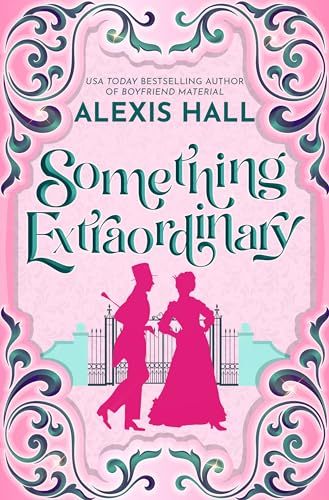
2025 reads / storygraph
Something Extraordinary
historical platonic-romcom
an aromantic woman tired of feeling unworthy when the people closest to her leave her behind for romance, and a gay man in unrequited love who is planning on giving up and marrying a woman in misery and drunkenness
she kidnaps him the day before the marriage to stop him ruining his life, suggesting that they get platonically married instead - and on the ridiculous journey to scotland to elope, they have to convince each other if it’s what is best for them, and what they want out of life/love/and friendship
#something extraordinary#alexis hall#aroaessidhe 2025 reads#aromantic books#platonic-romcom that really delves into the characters and their relationship and it’s JUST what I crave so much#it’s the kind of aromantic narrative I want more of.#Someone who’s (mostly) content in their identity AND the narrative actively discusses and explores amatonormativity and being aro#(rather than just internalised arophobia; or aro but it’s barely part of the narrative)#I have read the first book in this trilogy and it was okay but not really my vibe; I skipped the second because of this.#I realise belle has some background development in that one but. well#I think this third book as the conclusion of her arc has the most important part of it to me#I appreciate how well this managed to have them both at separate points have to convince the other that eloping is a good idea#really digging into their characters and not feeling completely like ridiculous back and forth#(though of course it’s pretty ridiculous in many ways being the kind of book it is)#it’s very heavy on the witty regency banter which is fun to an extent but there’s a bit much for me - I guess I knew this going in#The pacing at the end is a bit weird with multiple timeskips.#I feel like it could have padded that out a little more and removed some of the earlier bits#Some of those parts like re: his parents felt like they could have used a bit More to them.#I also appreciate the ‘fuck you for planning to punish yourself by getting married to a woman without thinking about#what that’s like for her’ from MULTIPLE women lmao#aro woman x gay man friendships are very important to me. good dynamic.#anyway. did make me cry aromantically
62 notes
·
View notes
Text
Preparing myself to read a Persona 5 fic because it sounds super interesting but Maruki is a tagged character which means there's like a 70% chance that he's being mischaracterized
#if someone can recommend me fics where this Doesn't Happen i would be so glad#i will still read it either way but it's just a pet peeve#why can't y'all comprehend moral greyness#maruki ISN'T AN EVIL SUPERVILLAIN#HE'S NOT EVEN EVIL#i've written fics btw i'm not trying to sound ungrateful or anything. like i said i will read them#but it's not just with fics like he gets mischaracterized So Much from literally everywhere in the fandom#how did you play through the entirety of persona 5 royal and come to teh conclusion that maruki is an evil man#who manipulated teenagers because he is malicious and horrible#when the story quite literally tells you. that he is NOT an evil horrible person#i'm not gonna deny that he manipulated teenagers into playing into his plan but he is most definitely not evil#nor did he do it with malicious intent. nuance DOES MATTER 😃#persona 5#persona 5 royal#p5#p5r#takuto maruki#maruki takuto#fuck that teh up there i'm not going back to fix it i'll just sound like a cringe 13 year old on tumblr in 2014#i'm not saying you can't criticize him i'm saying that acting like he's evil on a shido level or even Near that is stupid#because. again. maruki is a morally grey antagonist. he is NOT MALICIOUS.#i notice it's usually akechi fans who do this because of akechi's attitude towards maruki in-game#akechi has been one of my favorite characters ever even since vanilla p5 when the ending to his character arc kinda sucked#but him being one of my favorite characters does not impact my ability to read analyze and comprehend text#i think the persona fandom in general should try it sometime 👍
52 notes
·
View notes
Text
The current chapter is coming to an end soon, which means there are two episodes left to revisit Liko and Grusha's unfinished business.. I still think there will be a few things to touch on, since Liko said she wanted to make him acknowledge her and has yet to do so.
She made peace with the fact she didn't pass her test (thanks to her conversation with Amethio!) and knows there are still paths she could take, so now it's up to Grusha to really see her. From what we know of the next episode so far, the Gym Leaders will all be present for the end of the Terastal Course. Liko will use Terastal against Onyx in the next episode and she will break the rules by doing so (that rule was introduced at the beginning of the arc so it could be broken by someone later). And the final episode of the arc will show Liko and Roy battling. So either one of these events will be instrumental to shift Grusha's perspective somehow and make him acknowledge Liko.
#liko#hz065#character notes#episode notes#whether grusha's acknowledgment means she'll be allowed to use terastal is another thing#there are still things left unsaid and i don't think they'll just end the arc without having liko and grusha face again somehow?#either way from the look of things there will be no rematch to conclude that plot point and i'm personally glad about it#because liko's implementation test had lots of nuance to it with grusha and everything#(and she performed really well in her test. she was resourceful and composed and used terastal at the right timing etc.)#that kind of narrative calls for a conclusion that doesn't involve a rematch because it'd be kinda simple imo#right now it's grusha who needs to change his perspective a bit and i think he will
9 notes
·
View notes
Text
'Trapped in the end!' said Sam bitterly, his anger rising again above weariness and despair. 'Gnats in a net. May the curse of Faramir bite that Gollum and bite him quick!' 'That would not help us now,' said Frodo.
Sword in hand Sam went after him. For the moment he had forgotten everything else but the red fury in his brain and the desire to kill Gollum. But before he could overtake him, Gollum was gone. Then as the dark hole stood before him and the stench came out to meet him, like a clap of thunder the thought of Frodo and the monster smote upon Sam's mind.
Now he tried to find strength to tear himself away and go on a lonely journey – for vengeance. If once he could go, his anger would bear him down all the roads of the world, pursuing, until he had him at last: Gollum. Then Gollum would die in a corner. But that was not what he had set out to do. It would not be worth while to leave his master for that. It would not bring him back. Nothing would.
Sam and vengeance in today's entry
#idk i have Thoughts about this... rambles ahead...#there's an interesting arc here with how sam approaches his feelings of vengeance in this entry#starting with the first quote. frodo's response to sam is so brief and doesn't get much time to sit with all the action going on#but i feel like it speaks volumes#at least in showcasing the different points they stand on#sam centers his resentment and feelings of revenge... he's quick to get frustrated and immediately goes for threatening gollum#meanwhile frodo is focused on getting out. he doesn't have time to nurse anger nor does he want to#it feels like he's advising sam to move past it because he knows it's futile to stay stuck in those feelings#then there's sam's fight with gollum#after days and weeks of building tension from his mistrust towards gollum... this is where the dam finally breaks#sam's been feeding into his resentment for SO LONG it's no wonder he gets into this state of blind fury towards the end#he set himself up to seek vengeance the moment he gets the opportunity#which in some way i'm sure does help him in fending off gollum... that strength had to come from somewhere#but once he's staved him off he continues to fixate that anger on gollum and forgets what he originally set out to do-- protect frodo#and then we're left with the final quote...#it isn't until sam has (perceived to have) lost everything that he is able to come to the conclusion that vengeance won't serve him#...a lesson learned a little too late?? maybe?? no?? it feels cruel to say that#i definitely do not want to take the position that sam was responsible for what happened to frodo#he was pinned in a horribly desperate situation and couldn't do much once gollum attacked#i don't think much would've changed if he hadn't had his moment of fury with chasing gollum#anyways newbie here-- i haven't read anything ahead from here so idk what character arcs await sam#but i'm interested to see if this is later built upon or acknowledged#end of rambles skdfjgkdjsfg#lotr newsletter#lotr newsletter march 13th#EDIT: I forgot to space the quotes out 😭#not a crime but they can get confusing to read when scrunched together hrnnnn
14 notes
·
View notes
Text
soooo I'm in the final dungeon of the main arc now 😅😅😅 sorry for not posting for so much of the story, hopefully I can come back and explain my many thoughts about it later, albeit very out-of-order. But I've always loved the endgame, so here's my very biased thoughts on a few of the skits at least:


ajskdsjf great question. I'm just gonna let Asbel pitch my long fic for me from now on 😅
On that point though, this is just further proof of that recurring character trait in which Asbel doubts his own virtues (probably because he "doesn't know [his] own feelings very well"). The backstory skit prior to this really drives this home:






Even I, an angst-loving fanfic author writing this exact premise, didn't have him go that far, though like Asbel I can't say with complete certainty that no possible universe could exist where this happens— extreme degrees of isolation, manipulation, and insanity could maybe get him to that point. But from my own fanfic take on his character, which I try to draw from canon evidence as much as possible, Asbel doesn't reach the "i wanna destroy the world" level simply because he's NOT like Richard, or Lambda for that matter— he's actually quite opposite from them as their foil.
Asbel's never been shown to harbor resentment or want revenge— not at Hubert for usurping him, not at the unknown Fendelian soldier who struck down his father. There's no skits in which he joins Richard in despising Cedric, even though the man murdered the king and tried to kill Asbel's dear friend too. Even Asbel's KO quote in battle isn't resentful, lamenting that "[he]failed everyone" instead of cursing his enemies for striking him down. I genuinely cannot think of a moment in canon in which Asbel seems to hate someone, but maybe my confirmation bias is blinding me to a good example (funnily enough, the closest moment I can think of rn is a skit in L&L in which Hubert tells him that Raymond's been stalking Cheria, and Asbel responds with a forced compliment laced w barely suppressed rage bc he doesn't want to insult Hubert's family 😅 but that's still more indicative of protective jealousy than resentment).
Asbel does get angry and defensive sometimes, but any hate he has is nearly always directed inward— for example, he doesn't swear vengeance against all monsters after one kills Sophie, he instead vows to make himself stronger so he'll never fail to protect someone again. He's driven by a sense of justice and protecting others rather than getting even or inflicting pain, he empathizes readily with his enemies even when they've hurt him or his loved ones, and he refuses to accept a reality in which others must suffer (and if anyone should have to suffer, he'd always rather it be himself; that's what it means to protect someone).
In short, I think that if Lambda had been with Asbel and forced Asbel to choose between saving himself or saving the world, Asbel would always choose the world. Even if he had lived through additional horrors bc some bastard author wrote him into a miserable role-swap AU 😅
#dolphin plays graces again#dolphin noises#2hcb1#wips#whoops! it's just another excuse to talk about asbel and my fic 😅#i remembered asbel's whole arc of empathy here but i didnt realize he pitched the entire premise of 2hcb1 as part of his musings 😂#i don't blame asbel for misunderstanding his own personality i actually find it quite in-character and endearing 💜#his self-doubt and hypocritically higher standards for himself are also quite relatable#as well as his compassion. i too was making sad noises during all of lambda's backstory 😅#along w commentary like 'poor little meow meow he was raised in a cardboard box all alone maybe we should be niceys to him' 👉👈#lambda is such a bastard but. what if he was misunderstood. what then.#anyway If you're curious about how I chose to answer Asbel's question well that's exactly what the fic is for!!#...i'll post it someday i promise 😅 but i think you can surmise from my conclusion here what direction the plot ends up taking#after all it wouldn't be a very interesting story if asbel acted exactly like richard did. role swap AUs are *supposed* to differ from cano
5 notes
·
View notes
Text
The thing is... if you think the pursuit of glory is stupid and immature and kind of worthless, this should probably make Achilles a more compelling Greek hero to you because his entire character arc is coming to the same fucking conclusion.
At the Embassy, Achilles spells it out--he has come to realize he values his life more than he values glory, more than he values the riches Agamemnon has promised him. He had a few days to think about it, and it turns out dying in a war that has nothing to do with him for men who don't respect him just doesn't seem that great a deal to him anymore. He wants to go home. There is the complication that all the other Greeks will die without Achilles' participation in the war, and so it is Phoenix, his mentor, and Ajax, his friend, who convince him not to leave then and there. He decides to stay and see what happens.
When Patroclus dies, Achilles realizes there was something he valued more than his own life--his friend. Without him, his life has lost that value he only just found, so he might as well pursue revenge or the empty glory and riches he no longer cares about. That's his tragedy.
By the end of the Iliad, Achilles is very much of the opinion that glory and riches weren't worth it, and when we see him again in the Odyssey, he says he would have rather been a long-lived humble shepherd or something rather than briefly a king of men.
So I guess my point is if your beef with Achilles is that glory is stupid, well, he agrees with you. Congrats on having the greatest of the greeks on your side. I've heard he's great in a fight.
#achilles#writing essays again I guess#tumblr keeps showing me all this achilles hate and it's like#idk it's so silly#you gonna blame the brainwashed teenager plucked from hiding for joining a war?#dude was fucking drafted#the iliad#if your argument is that he should have known better all along#then like idk man we wouldn't have stories I guess#tagamemnon
645 notes
·
View notes
Text
I did quickly go through the manga, with the help of the fanwiki, to see how much that "Atsushi's orphanage headmaster visions have been caused by Q" twist holds up (as sometimes, new plans come up as you write, especially if your series is over 10 years old)
In the first chapter, Atsushi has a flashback of the orphanage staff kicking him out, but they do not have individual identities. The first apparition of the headmaster as himself is when Atsushi is under the influence of Dogra Magra, in chapter 25, "Q":


His next apparition is in chapter 28, when Atsushi is being held in the Moby Dick, right before Lucy comes in and chooses to help him (note: that scene also compares Atsushi's abuse is to another person's, Lucy's.)

After that, there's chapter 39, "Portrait of a Father", where Atsushi doesn't hallucinate him, but we learn about who the man was to Atsushi, and witness his funeral.
His next hallucination is in chapter 52, at the very end of the Cannibalism arc. He explains to Akutagawa that the headmaster has been been haunting him less since (the final fight on) the Moby Dick, but has been silent since the funeral.


There are a few more mentions of the headmaster that I haven't mentioned, but a very notable one is that Atsushi saw becoming stronger and his upcoming fight against Akutagawa as a way to free himself from the headmaster's influence, much like Akutagawa saw it as a way to gain Dazai's approval.

I don't think we see Atsushi hallucinating the headmaster after this until chapter 122, but the Dazai hallucinations start showing up in chapter 63, so really not that long after the previous one. The next Dazai ones I could find were in chapters 78, 105 and 121.


The conclusion is therefore that Atsushi hallucinating the headmaster has been a very active and purposeful part of his journey as a character since very early on. It started manifesting after Atsushi's breakdown while under the influence of Q's ability, and it's taken various approaches as Atsushi faced different struggles, but it's always been there.

While wearing Dazai's face, the hallucination was given more credit in Atsushi's eyes, but its words were barely less sharp and hurtful. However, they did tend to push Atsushi into acting, rather than cowering and giving up.
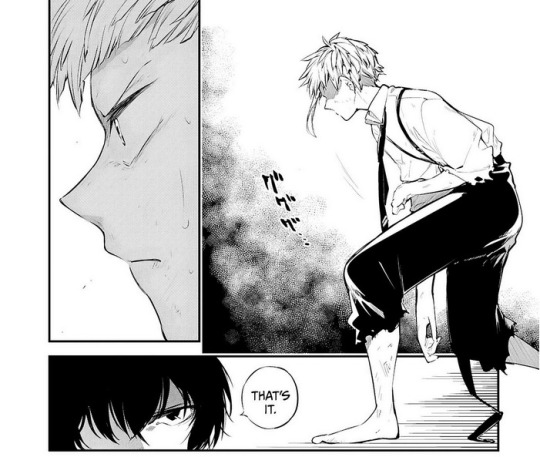
We're seeing Atsushi heal in real time, no matter how messy it is, and I'm so proud of him.
#bsd is bsd-ing i'm so fucking glad#I LOVE BSD#bsd#bungou stray dogs#bungo stray dogs#bsd 122#bsd spoilers#bsd manga spoilers#bsd atsushi#bsd nakajima atsushi#apparently i talk sometimes#bsd meta
449 notes
·
View notes
Text
Okay okay but that scene with Kevin and Jean in the kitchen really got me.
The "I can still hear him. Can't you?" and "best not to think at all" And then also the whole just casual use of alcohol as preemptive coping mechanism.
Like we see Kevin's breakdowns through Neil's eyes, his fear, his famous declaration after getting his tattoo covered in a drunken stupor. But from Neil's perspective, it's almost distant - if that makes sense? What we glean from Neil is only what can be physically observed and Kevin is reluctant to discuss anything that is not immediately necessary for Neil's safety or the success of the team.
But with Jean it feels so intimate and very humanizing. Jean has sunk so much of his trust and his life into Kevin, and to see Kevin fail to live up to those expectations is jarring through Jean's pov.
Even with all the panic and the drinking etc, Kevin is still idealized in Neil's perspective. He is Kevin Day, he is the queen of the court, Riko's number two. He may be a mess the minute he gets off court, but that hardly matter in the face who he is on court.
But for Jean, Kevin is just Kevin and everything else comes after. He is supposed to be "stronger than Jean" not because he is the number two or the son of exy or whatever, but because he is Kevin as Jean has known him since he was 14. He is Kevin who withstood Riko's abuse long before Jean got there and long after. Kevin who allowed a little sliver of softness to sneak through by asking jean to teach him his first language. Kevin who seems to slip into casual physical intimacy with Jean like it's nothing, grabbing coffee mugs and allowing Jean's knuckles to press against his palms. It is not the perception of Kevin as an exy player who is failing but it is Kevin himself, a very human self, that is failing.
I've always kinda felt as someone who adores Kevin, we never really got a conclusion to Kevin's whole arc. Like yes, he played against Riko and yes, he covered up his tattoo, but it's so clear that Kevin is still not entirely coping. There are so many loose ends left with his character at the end of the first trilogy.
We get to see Neil fumbling his way to a semblance of self-acceptance and hopefully we get to witness Jean slowly healing, but I don't think we're gonna get that with Kevin in a way that I personally would find satisfactory. Such is the plight of being a non-pov character I suppose. That is to say that I need all the crumbs I can get.
367 notes
·
View notes
Text
ur all crazy for believing that Buck denying his feelings for Eddie means he doesn’t have feelings for Eddie.
I know this sounds counter intuitive. but I think if they were telling the audience that Buck loves Eddie as a friend, he would be reacting very differently to Eddie leaving.
in the context of the episode, buck spends the whole time talking about eddie and processing that eddie is gone. We saw the reactions eddies friends and collegues had to his departure, they are happy for him. buck cannot be.
Furthermore, so far in the season, his entire arc is losing Eddie. If the show was working towards buck and tommy getting back together, his feelings for tommy would have been raised at least once. instead, for the whole three episodes, buck is freaking out over Eddie leaving.
My point being, narratively speaking, buck’s arc is about Eddie, not about Tommy.
Now yes, buck and Tommy did hook up. But they hooked up in Eddie’s house, and 1/2 conversations we saw them have was about Eddie. Eddie looms like a fridged wife over their hook up and the narrative. and now we get to the denial.
The show is textually introducing the concept of Buck being in love with Eddie. This needs to be done because while a lot of fans are seeing the chemistry between the characters, there’s an epistemic gap that needs to be bridged to where the show itself can make their relationship into Plot.
We are starting thus, with their dynamic as codependent best friends. It would be boring to have Buck wake up one morning and simply come to the conclusion that he is in love with Eddie. This realisation has to come from a level of conflict in the story. Buck has to change in some way, grow or evolve in order to reach this conclusion. So, this episode was the set up to begin that growth. The idea of him being in love with Eddie is introduced, and he vehemently denies it.
BUT the denial is rather weak.
“You live in his house” - “it’s not his house, he’s a renter”
“You have feelings for him” - “he’s straight, plus I don’t have to sleep with everyone I have feelings for.”
In the scene with Tommy, he doesn’t even say that he’s not in love with Eddie, he is flustered, gives excuses, then lashes out because the conversation is uncomfortable.
In the grander scheme, the textual confirmation that Tommy broke up with Buck because he saw Eddie as competition adds more credence to Buck and Eddie being the end game couple here, not Buck and Tommy. We don’t see any of Tommy’s interior world, his thoughts or feelings. If this was about Tommy’s insecurities, it would be established that way. When it is raised in this latest episode, Buck would have gone “no girl, I don’t like him I liked you, why did u break up with me over that?” And we would get a scene of them deepening their bond and discussing their insecurities.
Instead, Buck lashes out in discomfort, pushes Tommy away again, and then goes to Maddie. His main take away from his conversation with Tommy is him being in love with Eddie. If it was about Tommy, the conversation would focus on how Buck hurt Tommy, how he feels guilty and needs to make amends. While this does come up, the focus of the conversation is the Eddie thing. Again, Buck denies his feelings, using Eddie’s heterosexuality as a shield. Maddies reaction here is more interesting to me. Her calling into question Buck’s feelings towards Eddie, as someone close to Buck, is confirmation to me that buck is not a reliable narrator of his own emotions at the moment. She has seen his journey to discovering his sexuality, and understands that he is sometimes clueless to the obvious things in front of him. Her calmly calling into question how he feels is the first time he is given space to consider this reality.
Once again, if it was about Tommy, the Eddie thing would be discussed as something Tommy said, why he might think that. But the main focus is on whether Buck is in love with Eddie or not.
On a separate note, Buck is baking again. He’s not baking over his break up with Tommy, he’s baking over his loss of Eddie. This parallel, showing bucks feelings for Tommy as equivalent to his feelings for Eddie, by showing him coping with their loss in the same way, is honest to god textual evidence that buddie is going canon. Yes it’s a small detail but I think an important one.
Buck isn’t even aware that he’s doing it, he’s absentmindedly baking from the moment Eddie leaving becomes real. Much like he’s unaware of how he feels about Eddie. He’s coping the same way out of instinct.
While his words speak to one reality, his actions speak to another. There is a very clear line being drawn between how Buck is reacting to Eddie leaving, and how everyone else is feeling. Textually introducing Buck being in love with Eddie with a denial of this does not necessitate Buck not being in love with Eddie. It speaks to an arc beginning. If the arc was Buck and Tommy being getting back together, Buck would be focused on their hook up and conversation, not on whether he’s hypothetically in love with his straight best friend.
#911#9-1-1#buddie#Eddie Diaz#evan “buck” buckley#if I see one more person say that this show isn’t that nuanced and Buck saying he’s not in love with Eddie is putting it to rest I will cry#no this show is not subtle#so it’s extremely wild to me that people r still missing the point#Tommy fans r weird ngl#he’s such a dull and nothing man#I do not get why anyone wants him to have more screen time#plz free me from seeing his annoying face#and his one tonality that he does to indicate that he is gay#hulks son gave Tommy a gay voice and was like that’s enough acting actually ❤️#buddie is just so much more compelling and exciting in every way#bummy is just two dudes kissing there’s absolutely no depth or substance there#and none of this is ground breaking queer rep btw#it’s all cis gays lads#and if u hate Eddie ur so weird#acc what’s ur issue#n e way#enough hating#anti bucktommy
343 notes
·
View notes
Text
It just seems like some people couldn't handle the themes in Canto 7. Those being that well-intended, entirely non-malicious people without a mean bone in their body, can monumentally fuck things up for everyone around them, and that this isn't a reason to give up any hope of trying to make a better world, but only that you need caution and foresight while doing so.
There are people who are angry Don Quixote Sr. is just a nice, goofy dad and the worst things you can say about him are that he has a favorite daughter and he didn't consider the flaws in his grand plans. There is no sinister undercurrent here he's just a dumbass, just like the original Don Quixote from the novel. He's a man caught up in his own fantasy world and drags other people into it, and while he's got the optimism and morals of Man of La Mancha he has all the disastrous end results of his book counterpart.
Then there are people mad that Sancho chose to keep the monicker 'Don Quixote' in memory of her Father, and continue to pursue his dream for a better world, even if it may not be possible. When frankly, her coming out of this chapter a broken husk of her former self and stripped of all joy because "the world is a cruel evil place!" would have been boring and cliche. Not to mention, wallowing in your own misery and hopelessness is the easy way out - continuing to believe in a better future and smiling through is much harder. I think Don choosing to be happy as a conscious choice, not something out of ignorance, is a great conclusion to her character arc.
Overall, I loved the ending of Canto 7 and I love Don Quixote even more than I already did before.
440 notes
·
View notes
Text
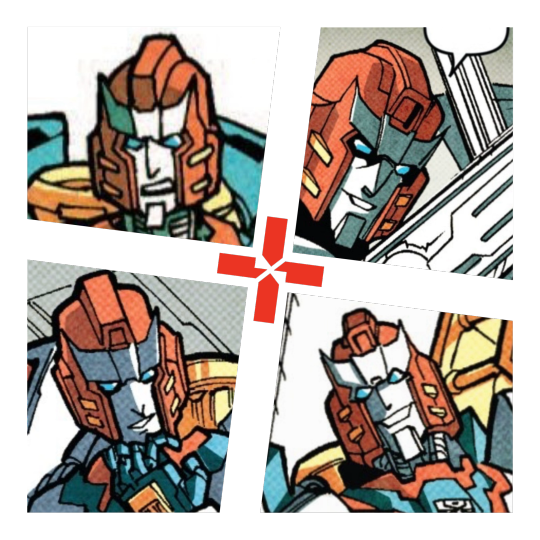
Medic, Maverick, Maniac, Murderer: Understanding Pharma
First thing’s first: I love Pharma, dearly.
In all the time I’ve spent evaluating his character, I’ve mainly focused on what can be worked out about who he is as an individual: his core sense of self, psychological drives, subjective worldview, etc.
When all else is stripped away, who is Pharma?
This treatise is the product of obsessing over Pharma, analyzing canon (and extras), and reading as many different perspectives on his character from fans across the fandom as I could find. The post is long, so for those of you who balk at the thought of reading a shortfic’s worth of Pharma thoughts, feel free to read the TL;DR (Conclusion) at the end and then decide if the full read is worth your time. Also, a premium reading experience is available in the form of the original Google Doc version.
As you read, keep in mind that this is primarily a mix of psychoanalysis, evidence-based examination, and speculation—not moral, ethical, or sociological commentary. The goal is to examine Pharma’s psychological drives and core values, and each of his appearances in the context of those. All other types of evaluation are up to readers.
Now, take your victim blaming-allergy meds (just in case); remove your black-and-white thinking caps; and leave your personal morality lenses at the door.
Psychological Drives & Core Values
Why does Pharma act the way he does? What gives him a reason to keep living? What are his personal priorities?
At the beginning of the Delphi arc, First Aid establishes Pharma as a “control freak” and someone who “thinks he’s an expert on everything.”

Now, First Aid has a habit of complaining about his bosses, but on both points, there’s canon evidence to back them both.
Expertise and Intellect
Throughout the Delphi and Luna 1 arcs, it’s established that Pharma is a skilled and brilliant doctor.
He once performed a 4-way fuel pump transplant, donating his own fuel pump in the process. (see above panel)
Later, he invented a soundbomb that left an echo laced with a virus and invented an antidote to that virus:
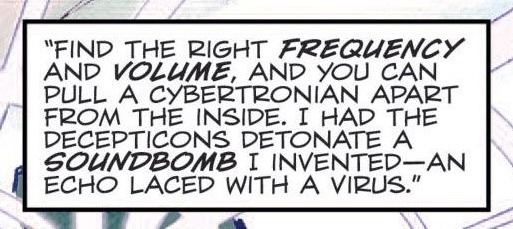
And on Luna 1, he was on the edge of finding a cure for Cybercrosis, based on the fact that Swerve was able to formulate a cure from his notes.
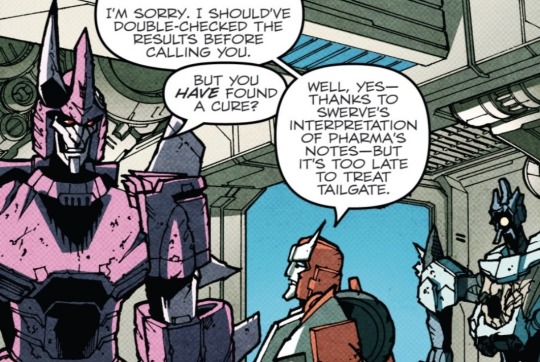
More than being a doctor, Pharma lives for intellectual and scientific achievement as a physician scientist. He feels most alive when he’s able to solve complex medical problems, and when his achievements are recognized by those whose opinion he considers important.
This is Pharma’s 'why.'
And even though he’s arrogant and enjoys praise, it’s not his primary motivation. He doesn’t need it in order to set his mind to whatever he’s interested in, although he’ll seek it from those he values most (i.e. Ratchet).
Pharma sees himself as less of a doctor, and more as a scientific innovator or medical maverick. The practice of medicine is primarily a catalyst for his creativity and intellect; it’s not an end in and of itself like it is for someone like Ratchet or First Aid.
First Aid’s observation of Pharma can be better phrased as, “[Pharma] thinks he’s an expert on everything medical”—because he’s not so driven by achievement and admiration that he’ll grovel at the feet of strangers and get good at something he doesn’t personally find interesting. The only time we see him express a desire for praise is when he’s around Ratchet—someone he holds in high regard for both personal and professional reasons. This makes sense since Ratchet is one of the only people who can give Pharma any kind of competition within what he considers to be his area of expertise.
“Each day we go to our work in the hope of discovering—in the hope that some one, no matter who, may find a solution of one of the pending great problems—and each succeeding day we return to our task with renewed ardor; and even if we are unsuccessful, our work has not been in vain, for in these strivings, in these efforts, we have found hours of untold pleasure, and we have directed our energies to the benefit of mankind.” —Nikola Tesla
Ego
Without question, Pharma has an inflated ego, but having an inflated sense of self doesn’t automatically mean a person is a full-blown narcissist or that they are totally uncaring.
Every personality trait exists on a spectrum. Yes, Pharma is arrogant, but the presence of arrogance doesn’t automatically and completely cancel out all “positive” traits. (For fun, check out studies on Dark Tetrad and Light Triad personality traits.)
People are complex. Arrogance can coexist with genuine kindness, ruthlessness can coexist with deep compassion, etc.
Whether Pharma exhibits genuine kindness is up to each reader’s interpretation of what little canon material exists, but the point is: Pharma’s arrogance doesn’t automatically rule out the possibility of authentic “positive” traits.
Controlling Tendencies
Pharma is comfortable pulling the power card and using it to dump what he sees as uninteresting parts of medical practice on those below him:
“So Fisitron’s writing about the Wreckers’ elbows now, is he?” said Delphi’s Chief Medical Officer. “Come on, First Aid - get to it. You’ve got a Fader in Row 2 downstairs.” He squeezed the air with his finger and thumb. “He’s about this far from shutdown.” —from Bullets by James Roberts
However, there’s nothing in canon indicating he’s power-hungry in a megalomaniacal sense. He’s not Starscream or Megatron; he doesn’t seek political or social power. In fact, he seems perfectly happy hiding away in a lab or medibay by himself so he can direct all his energy toward solving issues and achieving the so-called ‘impossible’ within the field of medicine:
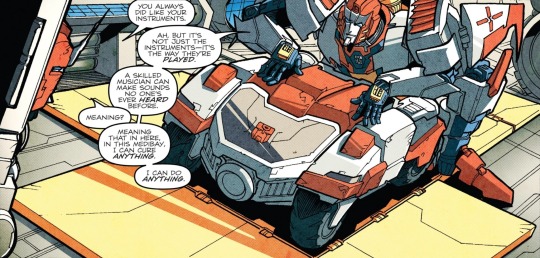
The ways in which Pharma exercises power and control are through his expertise, and his administrative/management skills. That’s it.
Self-confidence
Pharma’s arrogance and controlling tendencies don’t seem to be a mask—like he’s trying to compensate for some sense of lack (in those areas). Yes, he fears failure, and yes, he displays some insecurity when Ratchet questions his competence. But at every other point and in every other way, Pharma is unapologetically self-confident. He’s fully self-assured of his intellectual prowess and problem-solving capabilities; he knows what he knows, and he also knows what he doesn’t know.
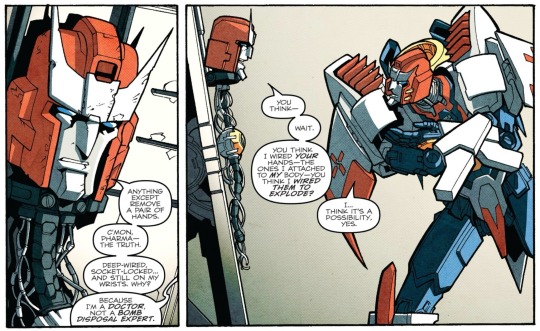
Pharma’s arrogance and desire for control don’t stem from a hidden lack of confidence or a hunger for power on its own. They stem from the fact that he genuinely sees himself as the best person for the work he does. He trusts himself above anyone else to solve problems that come his way—medical or otherwise (within limits).
Elitism vs. Superiority
I’ve always read Pharma as having an elitist attitude, but not in the social stratification sense:
elitist (adj.) relating to or supporting the view that a society or system should be led by an elite.
There’s no evidence that Pharma believes an elite class of people should hold the most power. Instead, Pharma’s “elitism” is actually an individualistic sense of superiority. It’s centered on him alone, and is tied to his capabilities as a physician scientist and surgeon.
Pharma sees himself as the best of the best and makes sure everyone knows it—sometimes through his words, but mostly by his conduct in the field of medicine. This, paired with Pharma’s natural temperament, doesn’t exactly make him socially popular—inside or outside of medicine:
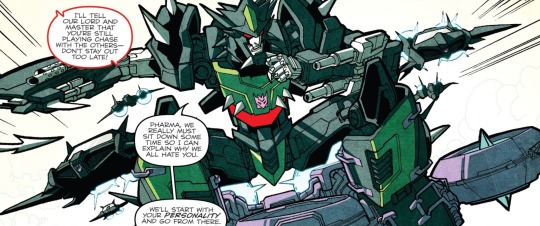
One could argue that the “personality” Lockdown is referring to was a result of all Pharma had suffered at Delphi and Luna 1, but just as easily, one could argue he was always a bit difficult to get along with, and that his traumatic experiences merely magnified his already-present psychological patterns. Personally, I like the latter interpretation because it’s a flaw that makes Pharma a more interesting character no matter his mental state.
Everyone reacts differently to real and perceived social rejection. Some are so concerned about it that they’ll try anything to belong; others genuinely don’t care, and they continue as usual; and still others cope by shifting their mindset and developing a sense of pride in being an outsider.
There’s no evidence for this in canon, but I believe it’s within reasonable characterization boundaries to headcanon Pharma as being in the second or third category.
With either of those two mindsets, a sense of superiority can develop, or even be an inciting factor. Either someone sees themselves as genuinely superior to the majority and doesn’t mind when this alienates them from people, or they convince themselves they’re superior because the pain of accepting they were rejected for who they are is too much to handle.
Whatever the case, the point is, having an “elitist” attitude isn’t necessarily rooted in a sociological or ideological belief. Sometimes, individuals just see something in themselves that—to them—justifies a sense of personal superiority. A quick glance at Pharma’s canon appearances makes it clear he holds such a view of himself, at least to some degree.
Morality and Compassion
When Pharma first shows up in canon, he’s working at the New Institute. A lot of questionable things took place there on a regular basis—things Pharma would have been aware of, to some degree. However, his presence at the Institute doesn’t automatically mean he agreed with everything happening. Depending on how strongly someone feels about something, some people are content to disagree in silence. Not everyone who seeks employment considers it a priority that the establishment they work for aligns perfectly with their moral values. After all, there are other reasons to take a job: financial benefits, exclusive educational and career opportunities, pure convenience, etc.
I’m not here to say either way whether Pharma’s willingness to turn a blind eye to the events at the New Institute was wrong or right; that’s up to each reader to decide for themselves. However, Pharma’s choice to remain employed at the Institute for some time can say something about him as a character: his priority as a doctor and person is not to take care of everyone he encounters, or to act as some kind of moral or ethical authority.
This isn’t to say Pharma won’t ever stand up for something he regards as right or push back against something he sees as wrong, “off screen.” It’s just that everything in canon points more to a tendency to choose his battles instead of acting immediately on any moral sense the way someone like Optimus or Ratchet might.
This also isn’t to say Pharma doesn’t care about saving lives, but from what little is shown of him before Delphi, it’s hard to say how much he cared. Ratchet confirms later that Pharma was an excellent doctor for most of his life, but all that tells us is he was an excellent doctor; it says nothing about his internal attitude toward his work or patients.
However, inferences can be made based on doctors in our own world:
Being a doctor—especially one in trauma care—is far from easy. It takes a lot out of a person, and there are very few people who last in the profession for a long time. Most medical professionals fall into one of the following categories:
People possessing a strong will that’s coupled with an unwavering passion for taking care of others (the public’s favorite)
People who naturally have, or develop, an ability to switch their empathy off and on at will, or build walls around it—also possessing a strong will (the ideal)
People who naturally have a limited capacity for empathy (the one the public hates to acknowledge)
People with a strong social and professional support system (the necessary, but underutilized and underappreciated factor)
Of course, even if a person has one or more of the above, burnout can and does still happen, but individuals who have at least one have the best chances of surviving and thriving amidst the demands of the majority of medical professions.
As far as is shown in canon, Pharma never had a strong support system—either circumstantially or by choice—so something else was keeping him in medicine.
Pharma shows concern for both Tumbler (Chromedome) and Hubcap:
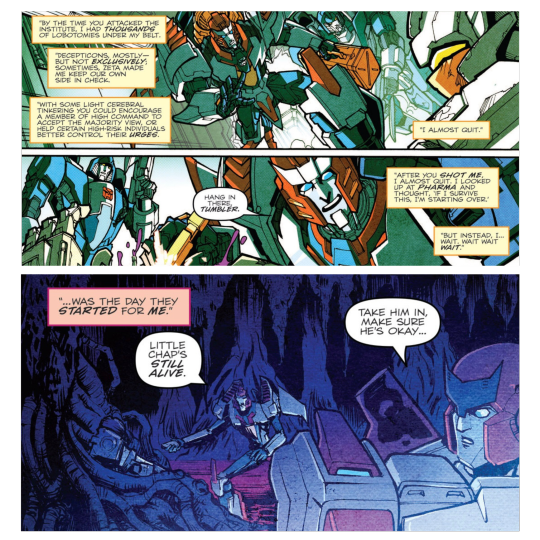
But even though he obviously cared enough to step in, neither instance makes a strong case for a capacity for empathy beyond the “average” or “norm.” Performing a job well is a lot different from being personally invested in the work.
Based on everything up to this point, and this later comment from Pharma, about Ratchet…
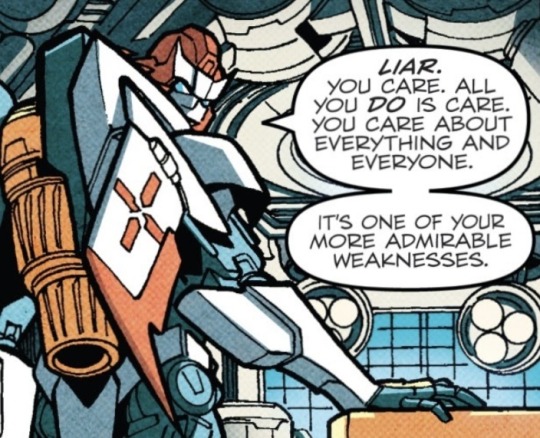
…Pharma has probably never shared the same I-care-about-everything-and-everyone view of the world. Instead, it’s more likely that Pharma holds a more rational view of his work and patients.
One of the first things learned in medicine, especially in trauma medicine, is that you can’t help or save everyone, and to hold yourself to that standard can destroy you quickly if you have a certain temperament or lack healthy boundaries for your empathy.
“There are times when it may seem as though I view sick or injured people not as living, breathing humans with feelings and emotions and people who love them, but simply as cases, as problems to be solved. And that is absolutely true. It's not that I don't have empathy, but the hard fact is that as a doctor, and especially as a trauma surgeon, too much empathy can get in the way of your job and cause you to make decisions based not on sound medical judgment but on your own emotions. Sure, I've seen things that even years later can still make me choke up when I think of them: a little girl shot and killed, a shattered young Marine who shouldn't have died but did. But you can't choke up in the ER or the operating room. To be effective as a trauma surgeon, you have to put a layer of Kevlar around your heart.” —Dr. Peter Rhee, Trauma Red: The Making of a Surgeon in War and in America’s Cities*
Pharma may have learned this difficult truth earlier than Ratchet and developed a practical way of managing his empathy that comes across as “cold.” He may have always had an ability to put up walls around his spark. Or, he may have always had little to no capacity for empathy.
The fact that the morality lock on Tyrest’s portal prevented Pharma from passing through proves he felt guilty for what he’d done, and JRO confirmed this. Therefore, it’s safe to assume Pharma had some level of empathy for his former patients, suffering moral injury when he felt he had no other option but to start killing them.
Still, looking at Pharma’s psychological drives and his behavior throughout canon, it’s clear compassionate care and morality are subordinate to his other values and interests.
*I highly recommend this book, and learning about Dr. Rhee in general. He’s a huge inspiration of mine, and one of my main sources of inspiration when writing Pharma. Level-headed and capable, strong-willed, selectively empathetic, an excellent scientist, etc. He lives for the thrill of practicing medicine both on the floor and as an expert in his field who pushes trauma medicine to new heights through his research. He also takes great pride in his hands. Seriously—the man spent an entire paragraph and a half talking about his “good hands” and how they were one of two reasons he decided to go into trauma surgery. The other reason was that he “liked action and excitement, liked the feeling of being able to walk into a tough situation and take control.” (Sounds familiar…)
Delphi
First thing’s first: we don’t know how much Pharma did or didn’t know about the DJD before agreeing to take the Delphi assignment.
That far into the war, he would have known something about the DJD and their ways of terrorizing traitors and Autobots, but for whatever reason, he took the assignment anyway. Perhaps Prowl assured him the situation on Messatine would be monitored and that the security team would be enough. Perhaps he underestimated the DJD’s capabilities, or scale of territory, and thought he would be able to handle things on his own. Perhaps Prowl gave him no choice. Maybe it was all of these and more.
Whatever the case, according to JRO, Pharma didn’t hate Delphi before the incident with the DJD.
Word of god remains a touchy subject in fandom, but in this case, it’s important because it says two things:
The DJD left the Delphi medical team alone for some time.
Being on the edges of DJD territory didn’t automatically mean isolation and harassment by their hand.
On the second point, First Aid was free to come and go from Messatine as he pleased, seeing as he attended a medical conference at Kimia five years into his assignment at Delphi:
Five years ago [mid-Delphi assignment], the leader of the Wreckers had cornered him at a medical conference at Kimia, the space station that doubled as a weapons research facility. —from Bullets
And five years after that, he was able to not only contact Springer without delay about one of Agent 113’s bullets he’d discovered in an Autobot badge…
He raced upstairs to his computer terminal and typed in a certain frequency code for the second time in his life. A face appeared on the screen and grinned. “It’s me,” said First Aid. “And you're never gonna guess what I’ve got for you..!”
…but he was also able to meet up with Springer to hand off the bullet:
“Your friend has a funny way of making contact,” First Aid had said when he’d got in touch three days earlier, and he was right.
It’s not known if this handoff happened on or off world, but either way, the DJD didn’t interfere.
At some point, Tarn set his sights on Pharma and the Delphi team. Knowing the DJD, one can only imagine what Tarn used to show off his team’s capabilities and convince Pharma the best option was to cooperate.
In striking a deal with Tarn to keep the DJD away from Delphi, Pharma established his territory and ensured his continued security and the safety of his staff. As long as Tarn got his T-cogs, Pharma could continue on in relative peace. He could work his magic on bots that ended up at Delphi, carry out his management duties, and work on whatever projects or research he may have been conducting in his free time.
For whatever reason, after he first came into contact with Tarn, Pharma didn’t call for help. Communications were still operational, as Pharma wouldn’t have suggested contacting High Command about the Duobots if the team was aware of any comm malfunctions:
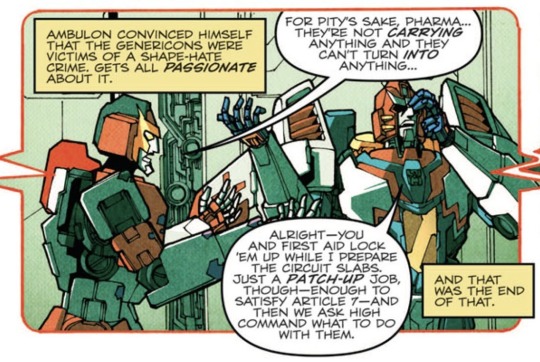
Also, First Aid later confirms that communications were fine until the Big Bang (soundbomb detonation):
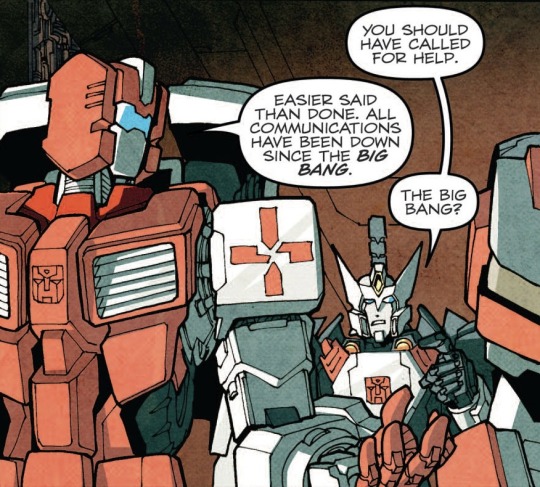
It’s always possible the DJD was monitoring the radio waves, but secure subspace frequencies exist, such as the Datalog Network First Aid used to send the datalog containing the death statistics:

Speaking of which, assuming First Aid sent the datalog with the statistics right when things started to get ‘weird,’ and before the Big Bang shut down comms, it only took—at most—a few days for them to reach Ratchet and Swerve on the Lost Light:

But back to Pharma not calling for help: for all of Prowl’s intel, contingency planning, and fretting over the security of Autobot territories, I find it hard to believe he would have stuck an Autobot medical team on the fringes of DJD territory without giving them some means of securely contacting the outside in case of issues.
But even if Prowl didn’t give Pharma a secure way to contact him or anyone else, and even if Pharma was convinced the DJD was monitoring regular communications, there were other ways he could have reached out for help. After all, the team wasn’t alone on Messatine. Like Pharma said, Prowl continued to send bots to defend the nucleon mines:
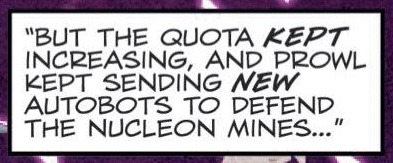
The Autobots had been mining nucleon for millions of years at this point, so I doubt the mined nucleon was just sitting in storage on Messatine; shipments of the stuff would have been sent off-world to wherever the Autobots needed it. Why not send a message for Prowl with someone leaving with one of those shipments? A message meant only to be sent over a call when absolutely certain they were out of range of the DJD’s potential monitoring.
Or, why not order in off-world medical supplies and send a message back with the delivery bot(s)?
There are two possible answers to this. One takes into account JRO’s word on the subject; the other is more intricate and speculative on my part, but it leads to the same place. So whatever your stance is on the validity of word of god, there’s an answer for you.
Answer one (word of god)
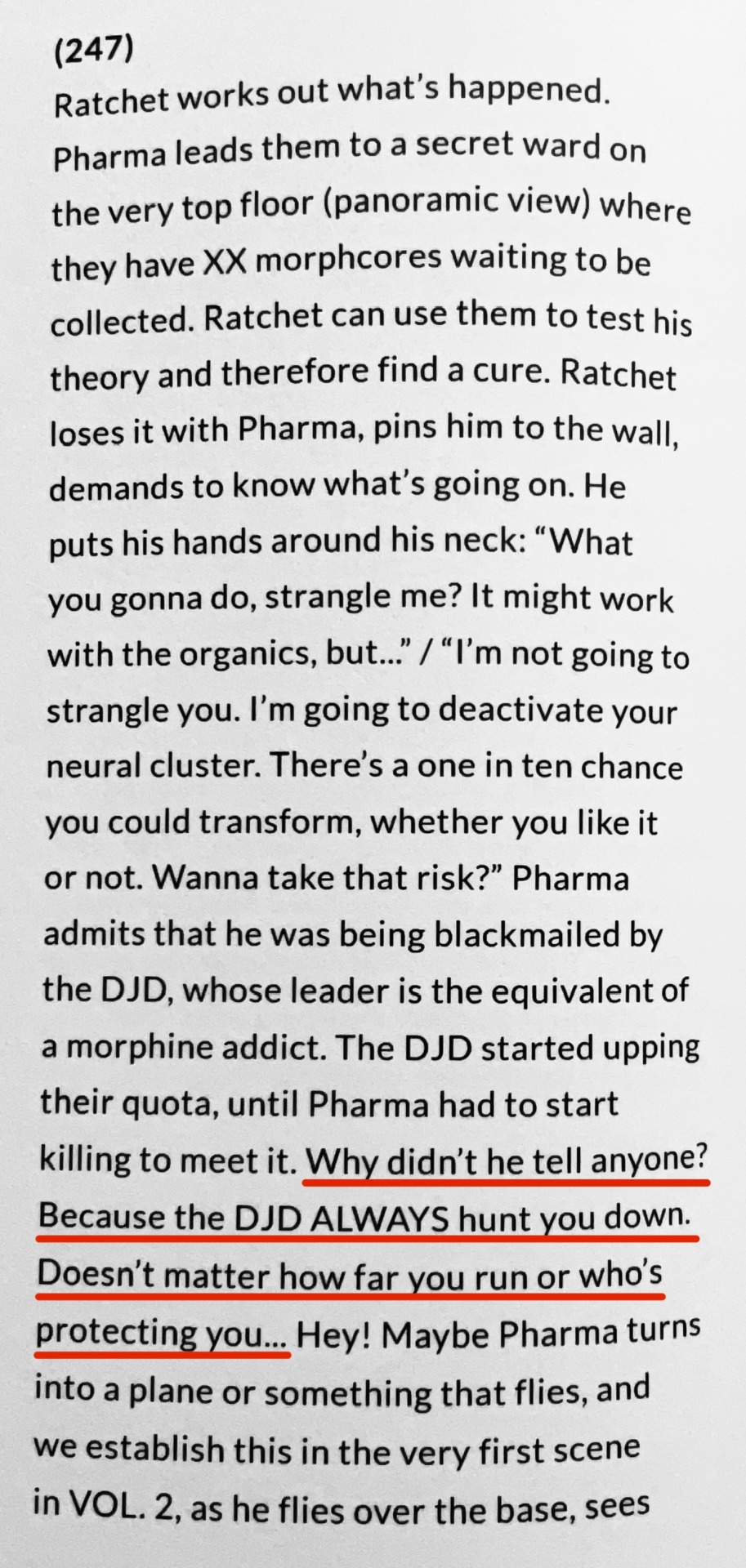
Simple as that. Pharma was aware of the scope of the DJD’s capabilities and relentlessness, and determined he was trapped prey.
Answer two (no word of god)
There are a few possible reasons Pharma didn’t call for help right away:
He was convinced all his other options would take too long and/or would still lead to him being put under suspicion. After all, being found to have harvested even a single T-cog from an already-dead patient for the DJD could have raised concerns that would lead to Pharma being investigated and/or having a mark put on his record.
He underestimated the severity of Tarn’s addiction, and was certain he could keep up with the T-cog demand without resorting to other means of harvesting, not realizing Tarn’s quota would increase later on.
He was already paranoid as a result of whatever mind games Tarn had set in motion at their first meeting, making Pharma think escape was futile.
Word of god or no word of god, there are clear reasons as to why Pharma ended up trapped. Most likely, it was a mix of all of the above.
Whatever was going on in Pharma’s mind before, he ended up in deeper trouble. Tarn increased his demand for T-cogs, and Pharma couldn’t keep up. By the time this happened, even if he had wanted to call for help, it was too late to do so without implicating himself. He reasoned his only option was to start killing patients to harvest their T-cogs.
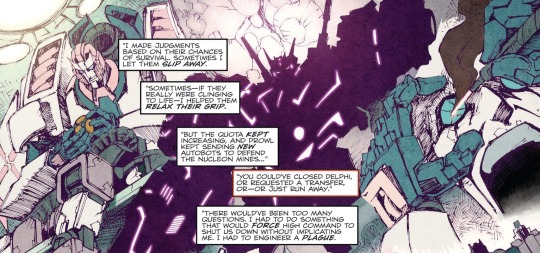
Soon, Pharma was so consumed with fretting over whether he’d be able to meet Tarn’s next demand that he didn’t have time or freedom to do anything else except worry and feel guilty. His whole life revolved around Tarn’s addiction; he was no longer in control, and could no longer enjoy whatever it was about Delphi he’d previously enjoyed. Perhaps the facility itself enabled Pharma to research cures and perform scientific miracles of medicine.
Being at the mercy of Tarn—convinced the DJD would find him no matter what—would have been pure psychological torture on its own, but also knowing that any small chance he did have of getting help would end in him losing everything would have added to his suffering. Pharma became desperate to reclaim control over his life and began planning an escape.
Now, JRO has said that Pharma didn’t originally plan to use the rust plague on the DJD…but canon says otherwise:

Of course, Pharma could have been lying to make himself look better in Ratchet’s view, but based on everything he’d been through up to this point with Tarn, it’s more likely he was telling the truth and had tried to eliminate the source of his suffering first. After all, wiping out the DJD would have been the simpler, cleaner option.
When the Duobots refused to detonate the soundbomb near the DJD, Pharma’s objectives shifted. He had to get Delphi shut down in a way that would:
Convince the DJD the shutdown was legitimate.
Pharma knew chances of escaping the DJD at all were slim to none, but he was desperate. Getting Delphi shut down would cut off Tarn’s supply of T-cogs and allow Pharma to escape Tarn’s immediate control, but the shutdown had to be “legitimate” to prevent Tarn from retaliating and hunting him down later. Leaving Tarn even the slightest chance of regaining control was too risky, so Pharma had to make sure his plan was as airtight as possible.
Cover up the patient murders.
If the truth got out about Pharma killing patients, he’d lose his medical license and most likely be put away for life. Being cut off from the practice of medicine and his intellectually stimulating work as a doctor would mean losing more than a job and a reputation. It would mean losing everything in which he’d anchored his sense of identity and life’s meaning. His refusal to consider any other options wasn’t just about ego and preserving his image as an excellent doctor; it was about preserving any kind of meaningful future he saw for himself.
Pharma needed a plan that would fulfill all of the above. Turning the engineered virus on the medical facility was the most effective and efficient solution. Anything else would have made him suspicious in the view of either Autobot High Command or the DJD, and neither of those would have ended well for him.
Because of his goal to preserve his reputation and future in medicine, he couldn’t even risk revealing anything to First Aid or Ambulon, who would have seen to his ruin. They became nothing more than loose ends that had to be tied up, and based on the fact that Pharma only prepared one vial of the vaccine, his original plan involved him being the only survivor:
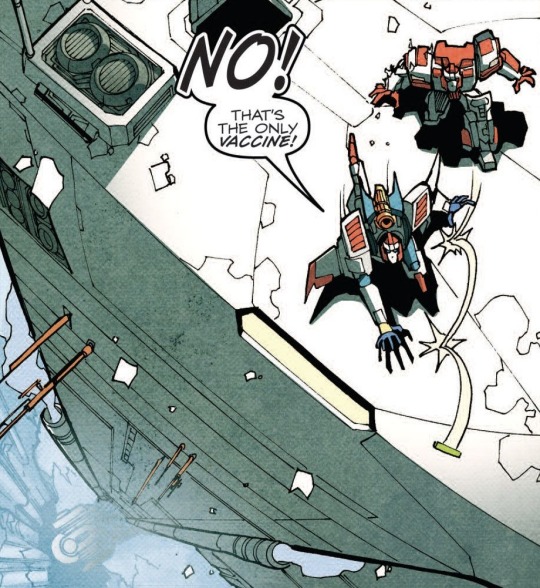
He probably would have had no problem making more of the vaccine for anyone else who survived, but he wasn’t counting on it. He wanted a totally clean slate; in letting his staff die with most of his patients, he would be getting rid of any and all evidence and reminders of his failures. He may have cared about First Aid and Ambulon before things got bad, but somewhere along the way, he decided either it wasn’t worth it to go through the trouble of finding a way to save them without raising suspicion, or he didn’t want to risk them putting together the pieces later on.
Of course, when Ratchet showed up, plans changed.
Ratchet
Ratchet is not the kind of person who seeks first to understand or be understanding. He’s inclined to trust what’s in front of him over anything abstract, and tends to look at the results of someone’s actions over trying to find any kind of ‘why’ behind them. Also, unlike Pharma, he operates from a strong moral sense, and reacts quickly and strongly when something or someone goes against that internal moral sense.
Ratchet’s reaction to finding out what Pharma did may seem hasty and harsh, but it makes perfect sense on a human level. There is no such thing as unconditional love; everyone has personal and moral lines (boundaries), and they’re different for each individual. When the most rigid of lines is crossed, that’s it; walls go up and the offender is cut off, no matter how strong the relationship may have been.
Ratchet obviously knew Pharma well enough to think he could try talking some sense into him, but then Pharma revealed that he’d crossed one of Ratchet’s lines: murdering patients. Any willingness Ratchet may have had to try to understand vanished. By the time Pharma started trying to provide a ‘why’ for his actions, Ratchet’s moral judgment had already shut down any chance of understanding what could have possibly led Pharma to kill patients. It didn’t help that Pharma seemed totally unapologetic and outright proud of his plan. For Ratchet, the ‘why’ didn’t matter anymore. What he saw was what he trusted, and what he saw was a friend who’d become his idea of a monster.
Now, Ratchet and Pharma’s relationship is one of the most confusing IDW relationships I’ve had the pleasure and pain of dissecting.
It is notoriously difficult to determine the depth and strength of a relationship from the outside. However, I’ve decided to go ahead and address it anyway because it has the potential to provide insight into Pharma as an individual.
If I were to sum up Pharma and Ratchet’s relationship in a single word, I would use “ambivalent.” The first time I read MTMTE, the thing that stood out to me most about their relationship was the drastic differences between how they each perceived the relationship.
In one sense, there’s the idea of Pharma basically being Ratchet’s crazy stalker ex, which is tossed around in fandom a lot. While I personally dislike seeing it regardless of context (yes, even as a joke), I do see how JRO’s writing choices set things up in a way that makes it easy to superimpose that trope.
In another sense, there’s the idea that Pharma and Ratchet were always close friends, and that what happened at the end of the Delphi story was a betrayal of both sides that came out of nowhere and whose consequences were taken too far.
I disagree with both. Personally, what I see at the end of the Delphi story isn’t an obsessed ex gone mad, a sudden betrayal, or a badly executed backstabbing. What I see is a breakdown of an already-complicated and poorly-maintained relationship: true feelings being revealed, long-repressed bitterness being forced to the surface, carefully-hidden cracks being split wide open.
Most people don’t have an accurate understanding of how much or how little they truly know the people in their lives, often overestimating how well they know a person until something surfaces and blindsides them.
According to JRO, Ratchet was oblivious to Pharma’s romantic interest, and throughout canon, it’s easy to see Pharma was more invested in the relationship than Ratchet ever was.
The question is, did Ratchet ever care about Pharma at all? And if so, to what degree?
Yes, Ratchet calls Pharma “buddy” and “friend,” but the former was sarcastic, and the latter means something different to each person. Also, in light of the circumstances, Ratchet could have just been saying “friend” in response to Pharma saying it—an emotional appeal more than anything.
However, Pharma must have been aware of Ratchet’s lack of relational investment because during the confrontation at Delphi, Pharma’s first reaction wasn’t to appeal to their friendship (ex: “But you know me!”). Instead, he appealed to their shared profession:
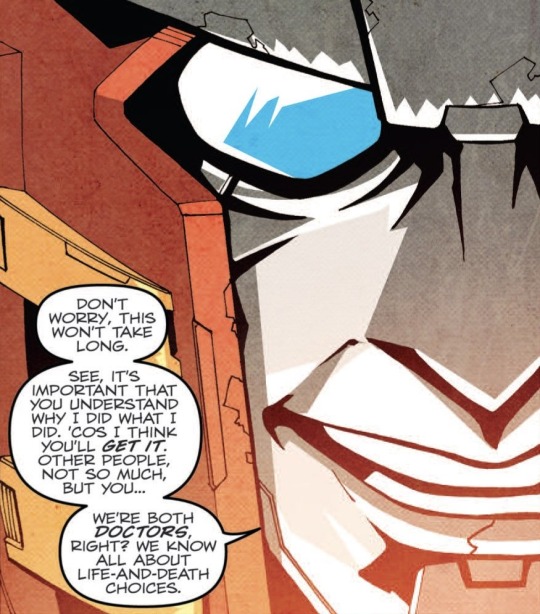
Then there’s the exchange of insults:
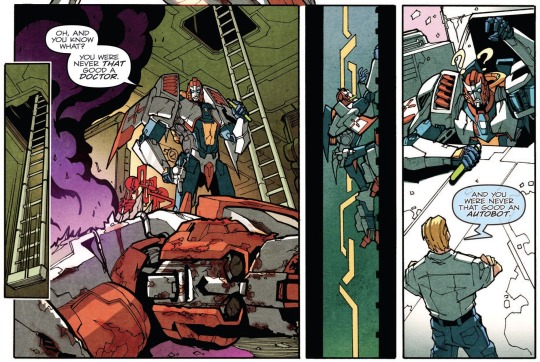
This is what I meant earlier by “true feelings being revealed.” Ratchet may have just been trying to match Pharma’s insult, but it’s unlikely it was merely reciprocal because while Ratchet is snarky at times, he’s sincere in that snark. There’s almost always some truth in his verbal jabs no matter how unserious they seem, and he’s never cruel for cruelty’s sake.
So, if Pharma saw Ratchet as an inferior doctor, and Ratchet saw Pharma as an inferior Autobot…it’s reasonable to assume there was always some deep-rooted competition and conflict preventing them from being super close.
Possible suspicion surrounding Pharma’s conduct as an Autobot paired with a tendency to misjudge the nuances of relationships could explain why Ratchet was so quick to decide Pharma was a lost cause. Maybe Pharma’s actions at Delphi confirmed something from the past that Ratchet had brushed off for whatever reason.
In any case, Ratchet seems to have been largely unaffected by the Pharma he found at Delphi. While leaving Messatine, he emphasizes that he’ll miss Pharma’s talent.

Not “who he used to be.”
Not “what we used to have.”
Just…“his talent.”
Later, on Luna 1, Pharma mentions that he and Ratchet were inseparable, but that could mean a few different things:
Best case scenario: Pharma and Ratchet sought each other out on equal terms.
Worst case scenario: Pharma followed Ratchet around.
Somewhere in the middle: the job forced Pharma and Ratchet to work in close proximity most of the time, and while Pharma intentionally ran into Ratchet more often than necessary, Ratchet also sought out Pharma every now and then.
Whatever the case, working with someone every day doesn’t tell you anything about who they are as a person, and the amount of time spent with someone doesn’t automatically correlate to how deep the relationship is or how well the people know each other. It’s not like either Pharma or Ratchet are shown to be good at expressing their personal feelings outside of extreme circumstances.
Ratchet does bring up late-night conversations of the past:

But while this indicates there was something deeper between him and Pharma, because neither of them were ever shown to be super open with their true feelings, it’s unlikely the conversations were full of touchy-feely talk. In all likelihood, the conversations were mostly medicine and war-related, with the rare spark-to-spark talk sprinkled in. Also, considering everything up to this point, one has to wonder if those talks ever meant anything to Ratchet, or if he was just digging for something that might stall Pharma’s torture.
Maybe those late-night conversations did mean something to Ratchet, but whatever the case, Pharma didn’t take the bait. He knew Ratchet was trying to stall by making an emotional appeal, and perhaps he was convinced the conversations hadn’t meant that much to Ratchet.
Looking at all of this, it’s hard to believe Ratchet ever cared about Pharma as more than an interesting work friend. But even if he had cared more than he let on, it wasn’t enough to overcome the doubts he had about Pharma’s character.
As for whether Pharma truly cared about Ratchet, I’m convinced he did, but in a mostly unhealthy way, and with a strong undercurrent of one-sided rivalry. At some point, Ratchet had been an equal and a source of challenge, and he probably listened to Pharma pretty often. It’s reasonable to assume Ratchet was one of the only people—if not the only person—able to handle Pharma’s intense temperament and challenge him in a meaningful way, providing some semblance of friendship for Pharma.
However, one last thing that stands out is that, when telling Ratchet why he’s torturing him, Pharma didn’t say anything like, “Because you hurt me” or “Because you turned against me—your friend.” Instead, he said it was for “ruining things at Delphi” and because “you declared war on my body.”
Either Pharma wasn’t being entirely honest, or Ratchet’s friendship didn’t mean as much in the first place as he’d previously implied. It’s possible the ‘Because you hurt me’ was implied in “for ruining things back at Delphi,” but why not say it outright? Perhaps it was a fear of vulnerability and admitting there was ever a relational need at all.
At the end of the day, it’s difficult to say for certain how close Pharma and Ratchet were, but it’s clear they were never on the same page and there were always barriers between them.
Luna 1
Revisiting the matter of Pharma’s morality taking a backseat to other priorities, his time on Luna 1 further underscores this. Again, Pharma chooses his battles and is unwilling to put himself at great risk for the sake of others, but a closer look at the situation with Tyrest reveals there wasn’t really anything he could have done for the Cold Construct population even if he had wanted to. It would have been him against Tyrest, an army of Legislators, and a bunch of Decepticons. Pharma knew his limits, and seeing as his goal was self-preservation, it was perfectly rational for him to go along with Tyrest’s grand scheme.
Besides, it doesn’t look like he was given much of a choice:

Although, knowing Pharma, he still would have demanded to know beforehand what he would get in return for the pain, and evidently, Tyrest held up his end of the deal since Pharma had access to the Luna 1 tech collection.
As for Tyrest’s plan to wipe out the Cold Construct population, there’s nothing indicating Pharma’s decision to turn a blind eye to it was rooted in malevolence or bigotry—just rational apathy: ‘I can’t stop Tyrest, so why concern myself with the outcome?’
Again, you can’t save everyone; Pharma had all he could do to save himself.
But it wasn’t all horrible. I would even go so far as to say Pharma found some happiness on Luna 1. Tyrest didn’t care about him, but he didn’t need Tyrest to care. Everyone else there hated him, but he didn’t need to feel like he belonged or was admired. At this point, Pharma’s only interest was Tyrest’s Luna 1 tech collection, and that meant playing nice so he could keep his reward. Back at Delphi, he probably assumed he’d never again practice medicine the way he’d loved; being brought to Luna 1 was an unexpected, yet welcome, second chance.
Even so, Pharma had his moments of cruelty. Back at Delphi, he had easily-identifiable reasons to kill patients—both the ones whose T-cogs he harvested and the 20 more he tried to kill when he shot the life support machine. But on Luna 1, he had no reason to be cruel, yet he chose to be. By this point, he’d mastered the ability to almost completely ignore or subdue his conscience.
In the case of Ratchet’s torment, one could argue Pharma only drew it out for retaliation purposes; it was personal for him.

As for cutting Ambulon in half, it was obviously meant to be as gruesome as possible, yet also quick. But personally, I don’t think it was about Ambulon; it was more about hurting Ratchet. Due to the fact that Ratchet’s identity is wrapped up in his compassion and his ability to be helpful as a doctor, one of the most effective acts of revenge would be to do something that makes him feel utterly helpless.
Also I wonder if, subconsciously or consciously, Pharma was attempting to recreate the sense of helplessness he felt back at Delphi under Tarn’s watch: “Do you see, Ratchet? Do you now understand how it feels to have control ripped out of your hands? To be totally helpless?”
Next, for some reason, Pharma was invested in the promised execution of Getaway and Skids:

He had no personal connection to either of them that would give him a reason to be interested, so maybe Tyrest told him he could perform the execution and/or have the corpses for medical experimentation. Either way, Pharma would have had a chance to use some of the tech in Tyrest’s tech collection, possibly explaining his excitement.
Of course, any chance of an execution disappeared when the final showdown went wrong.
When Pharma tried to escape to Cyberutopia and discovered he couldn’t pass through the spacebridge forcefield, he gave up. He’d been caught; he would no longer have access to Tyrest’s tech collection; Ratchet and every other self-righteous Autobot would never forgive him; and the morality lock prevented him from escaping. By all appearances, he would never again be able to engage in that which gave him a sense of meaning. He had shrunken his world down to his obsessive interest in a specialized field and one significant, yet unrequited relationship. With both of these lost, his world collapsed.
Yes, guilt played a part in Pharma’s despondency, but because he seems to have been in denial of said guilt, it’s more likely his despair was primarily due to the fact that he saw no future for himself. He had nothing left to live for.
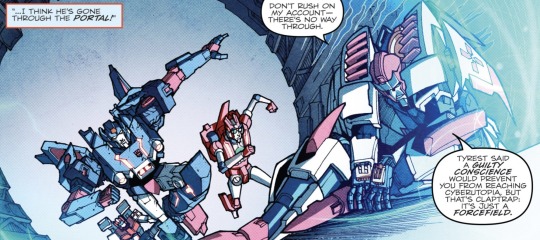
In light of this, Pharma’s flippant comments to First Aid make sense. He wasn’t being insensitive as much as he was goading First Aid. Pharma’s not stupid. First Aid had a massive rotary cannon on him, and Pharma knew exactly which emotional buttons to push to get him to pull the trigger.
Pharma wanted to die.
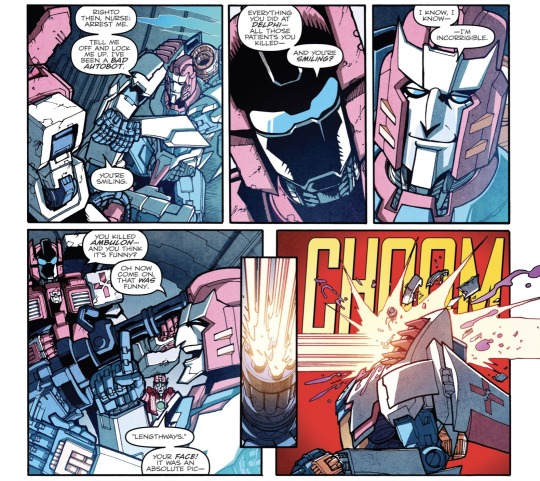
Adaptus
First, let me emphasize that Adaptus did not take possession of Pharma’s body. Instead, Pharma was the unwelcome guest:
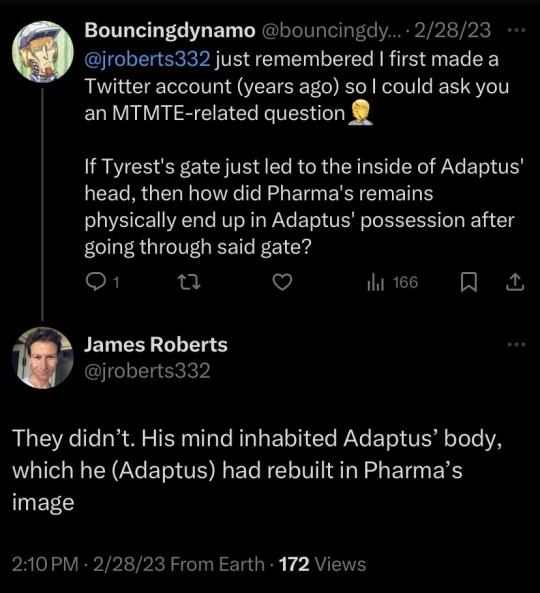
How Pharma ended up in Adaptus’ new body is a mystery, but whatever the case, Pharma didn’t pass on to the Allspark. Whether or not he had a choice can only be speculated.
First Aid had blasted Pharma’s head clean off, so whatever happened must have been related to the spark. Perhaps some residual spark energy was trapped in a body part that Adaptus repurposed, leaving Pharma tethered to the new body unwillingly.
Still, Pharma managed to assert his will and override Adaptus for a brief moment. Considering Adaptus was basically a god, this is impressive.
Based on Adaptus’ surprise at being interrupted, it seems he didn’t know Pharma was there. Why Pharma hadn’t tried to assert himself sooner is a mystery. Maybe Adaptus’ scheme was entertaining; maybe Pharma actually liked the company; or maybe he’d been waiting for an opportunity to get revenge on Tyrest for everything done to him back at Luna 1.
Sure enough, just like with Ratchet back on Luna 1, Pharma’s vengeful streak came out as soon as there was an opportunity.
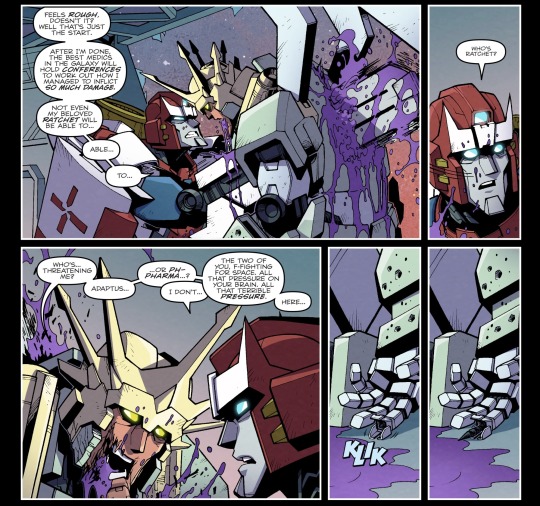
Unfortunately for him, this left him vulnerable, and Tyrest took advantage of the confusion:
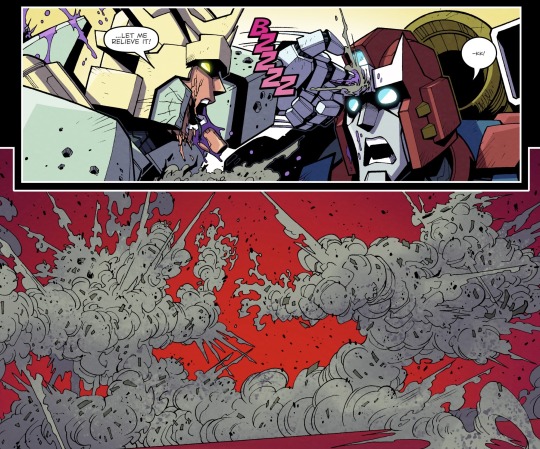
Conclusion
When someone reduces their world to narrow personal interests and one or a few very special people, their grip tightens around what little they have. They often become obsessive and possessive of the few things that make them feel alive, and their view of the world becomes increasingly more subjective and detached from the outside world. Pharma seems to have fallen into this trap.
Even so, in the context of the circumstances, several of the decisions he made were rational—even if coldly so. Oftentimes, “extreme” rationality and self-preservation are villainized in fiction, and characters like Pharma who don’t automatically put themselves at great risk for anyone and everyone are villainized, or at least looked down on. Their choices are often regarded as less human, but rationality and self-preservation are just as human as compassion and self-sacrifice.
Ultimately, Pharma was trapped and pushed over the edge into “insanity” by Tarn’s cruelty, but his own choices made from a place of pride determined how he fell, and how far he fell. It was a perfect storm of Tarn’s mind games and Pharma’s intellectual arrogance, excessive self-confidence, obsessive nature, and stubborn grip on the kind of future he wanted for himself.
Pharma is yet another Icarus who flew too close to the sun and paid dearly for it, and while JRO/the narrative could have given this Icarus better wings, that doesn’t change the fact that he chose to fly so high.
***
Many thanks to anyone who made it to the end of this monster of a post.
-tosses a Rodimus Star at you-
#idw transformers#idw1#maccadam#MTMTE#lost light#idw pharma#pharma#tf idw character analysis#tf idw meta#dr. fancy hands#nova’s nerding out again
716 notes
·
View notes
Text
Okay Louis and Juno's relationship in the anime is actually being butchered and that makes me so sad. I went back and re-read the kiss scene and it's baffling how downplayed Louis' feelings are in the anime??? Like. Look how the scene plays out after they kiss:
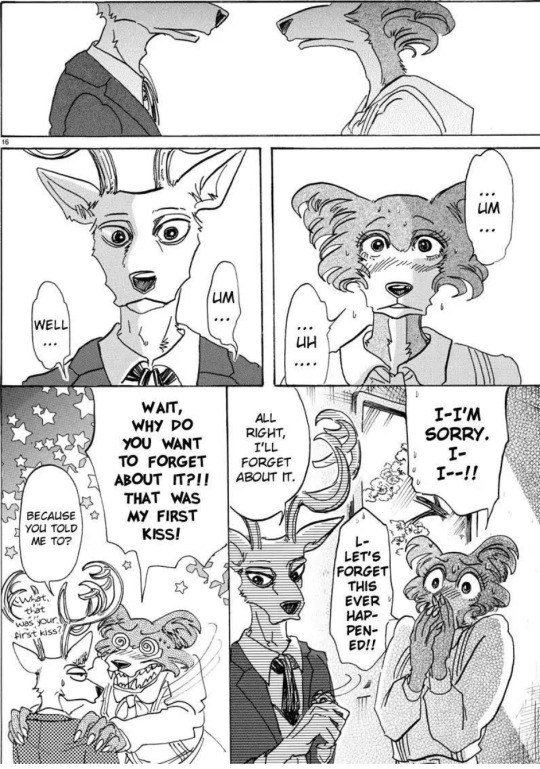
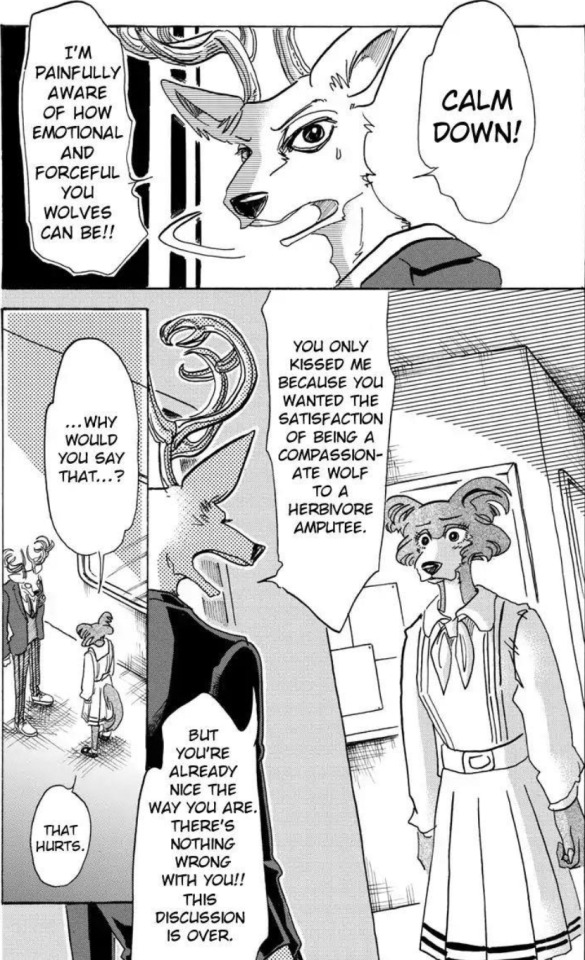
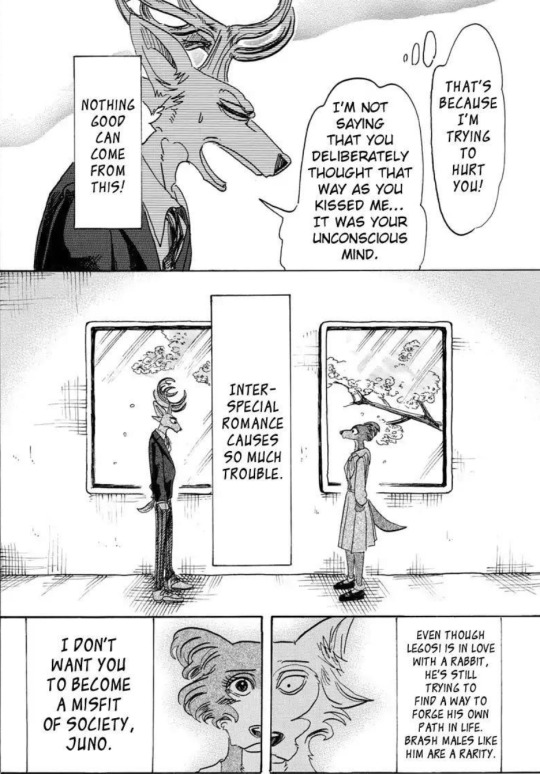
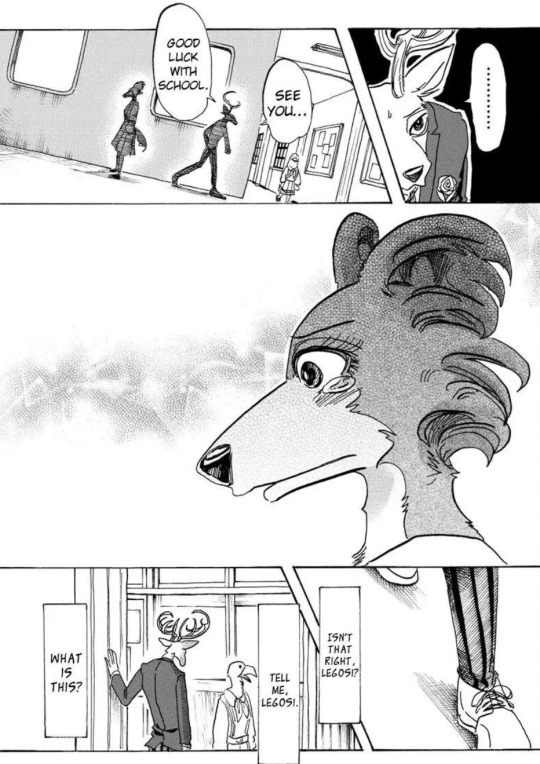

Those internal monologues are EVERYTHING. He doesn't believe the Sigma Male Nonsense he's spouting!! He knows Juno is a social climber who has trouble controlling her emotions so he's trying to get her to not sabotage herself by pursuing a relationship with him!!
Not only did the anime remove his internal monologue (only the ones that imply he might actually feel something for Juno btw. When he's thinking about literally anything else noooo we can make him monologue pff it's fineee) but they also knocked down Louis' reaction AND removed the shot of Juno crying.
Which brings me to my next point. The anime doesn't seem to take Juno seriously as a character. They're using her only as a comedic relief, you're not supposed to feel bad for her, you're supposed to laugh at how incompetent she is at romance and how Louis is too much of a Sigma to EVER fall in love with someone like HER. As if these panels meant nothing:
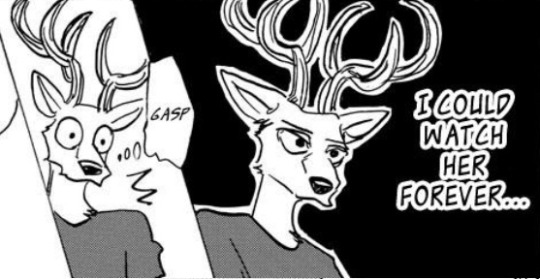
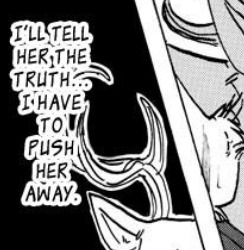
While Juno is a very immature and emotional character and her chapters tend to go for something lighter and more comedic the manga is capable of taking her seriously. Something the anime doesn't do. They take what's surface-level about Juno and go with that.
I think a BIG part of this change is the fact Louis and Juno don't end up together in the manga and they don't want to dissappoint people. I think that's fuckin stupid. The entire point of the love failiure arc is that interspecies romance is COMPLICATED and more often than not doesn't work out. Legoshi and Haru stick to their guns and make it work, but Louis prioritizes his position as heir to the the Horns Conglomerate which is why he and Juno don't end up together. It hurts, but it makes sense for the characters and the story. Removing this and downplaying it as "haha silly Juno and her silly romantic endeavors" hurts the story imo.
Anyway in conclusion. Look how they massacred my girl.
#welcome to me ranting about anime when i should be studying#but Louno is a special ship to me and it makes me sad that they're doing this to it#it also makes me sad that female characters can't have relationship trouble without it being treated as a joke#i'm worried about what part 2 has in store for them ;-;#long post#beastars#louno#beastars spoilers
303 notes
·
View notes
Text

12/16/2024
Pass me the SUMMAtriptan.
The saints' RPG adventure continues every Monday and Friday through December!
___
JOKE-OGRAPHY: 1. Continuing from the last few cartoons, an angel is running a fantasy RPG for some saints in heaven, namely Sts. Thomas Aquinas, Joan of Arc, Francis of Assisi, and Nicholas of Myra. They haven't quite gotten past the character creation/introduction stage yet, but I'm sure they'll find their way eventually! 2. The angel asks Thomas to introduce his character concisely. Some TTRPG players tend to overthink and overstress about their characters before the story has begun, leading to massive backstories and extended physical descriptions. 3. Thomas introduces his character in a very quick and simple way, just as the angel requested. However, just as the angel thanks him for not taking forever, Joan asks a question that causes Thomas to go on a long philosophical monologue, much to the angel's dismay. 4. Thomas's monologue is styled after his summa articles. He was a prolific theologian and philosopher, and some of his most famous works are his summa articles, in which he'd present a philosophical position, then several strong arguments for and against said position, ending in an ultra-strong and super-reasoned conclusion. Unfortunately, he never actually wrote about fantasy RPGs, so we won't know his real opinion on them in this life. That said, I did my best to capture the format and flavor of his articles. 5. Magic in fantasy has been a point of debate for Christians for some time. Should it be allowed? Is it of the devil? Is it a slippery slope? Is it a gateway to death metal, drugs, and Catholicism? My basic opinion is that fictional magic is simply a storytelling device. What you DO with that device is another question, but the device itself isn't evil. I've heard opinions going both ways, but what do YOU think?
#catholic#christian#comic#cartoon#catholic memes#christian memes#tomics#bible#angel#saints#st joan of arc#st thomas aquinas#rpg#ttrpg#magic#fantasy#using qua for the points
260 notes
·
View notes